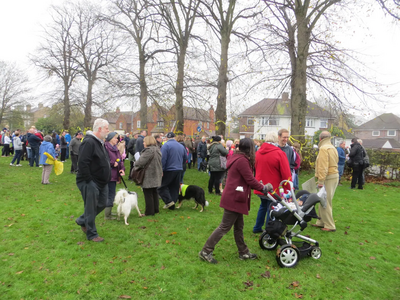Take our green fields say Rugby Tories

More houses need to be built. However Rugby Borough Council has already given planning permission for six thousand houses to be built on the old Rugby Radio Masts site. That planning permission alone is enough to meet Rugby's needs for about nine to thirteen years.
Meanwhile developers are eyeing up other green fields sites in and around Rugby. Residents are campaigning against proposals for Oakfield Rec - see http://rugby.lib.dm/a4PRK and prime farming land off Ashlawn Road - see http://rugby.lib.dm/sard1 .
So if you were one of the town's top tories what would you do?
Option A - press tory minister Eric Pickles to take Parliament's advice and end the loophole that may allow developers to press ahead with new greenfield schemes even where a local council has allocated enough land to meet all its housing needs for the next five years - see http://rugby.lib.dm/a1RD3 .
Option B - vote to recommend that Rugby Borough Council widens the loophole.
Yes, when Rugby's top tories met in Cabinet (see http://rugby.lib.dm/a0Rfg ) at the start of this month they went for option B.
What they had in front of them was a paper written by Sarah Fisher, one of Rugby Borough Council's senior employees. The paper said that back in 2013 it was thought that Rugby needed to build 660 houses a year to keep up with demand. However the most recent information was that a new study produced in 2014 showed that Rugby only needed to build 453 houses a year to keep up with demand.
Eric Pickles says that all councils should be able to show that they have enough land to meet housing demand for the next five years. This is a policy of the Coalition Government and is reasonable in itself.
However Eric Pickles policy document has been written so badly that some developers are arguing that not all planning permissions which have been granted should be included in the Council's calculations. As mentioned above Parliament has already pointed out this mistake to him - see http://rugby.lib.dm/a1RD3 .
Rugby's calculation of the land available for new housing should include all six thousand houses for which planning permission has been given on the Rugby Radio Masts site. However making use of Eric Pickles' loophole developers will argue that only 550 of these houses should be included in the calculation. But even if only 550 houses are included the Council officers calculate that there are still 2,935 plots of land available.
If Rugby needs to build 660 houses a year the 2,935 plots of land available using the developer's calculations are not enough and therefore developers can (and do) argue that they should be allowed to build anywhere they like.
However if Rugby only needs to build 453 houses a year the 2,935 plots of land available using the developer's calculations are enough to meet all demand for six and a half years. Where a council can demonstrate it has set aside this amount of land the Council can tell developers where the most suitable plots of land for development are.
So reading Sarah Fisher's paper the tories had a clear choice - would they go for the old, 660 houses a year, assessment of housing need and hand control the borough's green fields to developers or would they go for the most up to date assessment of housing need, 453 houses a year, and keep the borough council in control of Rugby's growth.
What the tories have recommended is that Council should go for the old assessment of 660 houses a year.
Their recommendation is a clear threat to Rugby's green fields.
